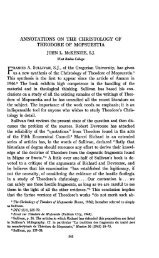Theology for Artisans of a New Humanity - Theological Studies
Theology for Artisans of a New Humanity - Theological Studies
Theology for Artisans of a New Humanity - Theological Studies
You also want an ePaper? Increase the reach of your titles
YUMPU automatically turns print PDFs into web optimized ePapers that Google loves.
CHALLENGE OF SEGUNDO 127<br />
commitment consciously and explicitly. On the other hand, Segundo<br />
asserts, "academic theology may well be unaware <strong>of</strong> its unconscious<br />
partiality, but the very fact that it poses as something impartial is a<br />
sign <strong>of</strong> its conservative partiality from the very start" (p. 13).<br />
It may be noted here that the continuing refinement <strong>of</strong> a distinctive<br />
methodology is not confined to Segundo's work, but is a characteristic <strong>of</strong><br />
all <strong>of</strong> recent Latin American theology. In the past few years, international<br />
conferences at Mexico City and at El Escorial in Spain were<br />
dominated by this theme, which the Brazilian Leonardo B<strong>of</strong>f has referred<br />
to as "a true methodological revolution." 5 Moreover, even specialized<br />
works in areas such as Christology and spirituality have been<br />
careful to enunciate the distinctive methodological principles adopted. 6<br />
An extraordinarily lucid summary <strong>of</strong> the divergences in method between<br />
European and Latin American theologians may be found in the<br />
address at Mexico City <strong>of</strong> Jon Sobrino; 7 this presentation deserves a<br />
careful scrutiny and response from Western theologians. 8<br />
analysis <strong>of</strong> works by Harvey Cox, Karl Marx, Max Weber, and James Cone. His<br />
conclusion is that Cone is the only one <strong>of</strong> the four who has successfully completed the<br />
circle.<br />
5 The proceedings <strong>of</strong> the meeting at El Escorial were published in Fe cristiana y<br />
cambio social en América Latina: Encuentro de El Escorial, 1972 (Salamanca: Sigúeme,<br />
1973). The presentations <strong>of</strong> Segundo in this meeting include "Las élites latinoamericanas:<br />
Problemática humana y cristiana ante el cambio social," pp. 203-12, and<br />
"Teología y ciencias sociales," pp. 285-95. The Mexico City conference is described in<br />
Liberación y cautiverio: Debates en torno al método de la teologia en América Latina<br />
(Mexico City: Comité Organizador, 1975). Segundo's major address at this meeting was<br />
entitled "Condicionamientos actuales de la reflexión teològica en Latinoamérica," pp.<br />
91-101. See also Raul Vidales, Cuestiones en torno al método en la teología de la<br />
liberación (Lima: Secretariado Latinoamericano, 1974) and Ignacio Ellacuría, "Posibilidad,<br />
necesidad, y sentido de una teología latinoamericana," in Christus 40 (February<br />
1975) 12-16, and ibid. 40 (March 1975) 17-23. The quotation fromB<strong>of</strong>f is from Liberación<br />
y cautiverio y p. 131. A young Franciscan, B<strong>of</strong>f has published a number <strong>of</strong> books in<br />
German and Portuguese, is editor <strong>of</strong> the leading theological journal in Brazil, and gives<br />
every indication <strong>of</strong> being one <strong>of</strong> the outstanding international theologians <strong>of</strong> the next few<br />
decades.<br />
6 The best-known Christological work in Latin America is clearly B<strong>of</strong>f s Jesucristo el<br />
liberador (Buenos Aires: Latinoamérica Libros, 1975). His five methodological principles<br />
are described on pp. 59-61 <strong>of</strong> this work, which is a Spanish translation <strong>of</strong> the third<br />
Portugese edition. See also the methodological principles enunciated by Segundo Galilea<br />
in his Espiritualidad de la liberación (Santiago: Ediciones ISPAJ, 1973) pp. 7-10.<br />
7 Jon Sobrino, "El conocimiento teológico en la teología europea y latinoamericana,"<br />
in Liberación y cautiverio, pp. 177-207. These ideas are thoroughly integrated into<br />
Sobrino's latest work Cristologia desde América Latina: Esbozo a partir del seguimiento<br />
del Jesús histórico (Mexico City: Ediciones CRT, 1976).<br />
8 The divergences that surfaced concerning the approach <strong>of</strong> Bernard Lonergan in<br />
Method in <strong>Theology</strong> (<strong>New</strong> York: Herder and Herder, 1972) are also deserving <strong>of</strong> careful<br />
attention. For example, in Liberación y cautiverio José Comblin states flatly: "creo que
















